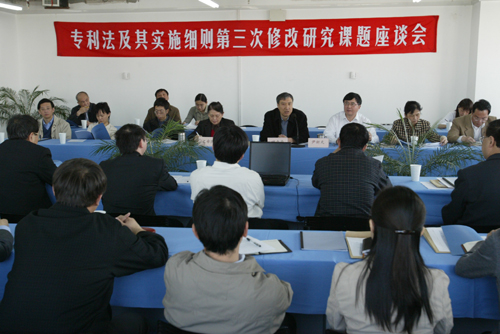Chapter VII Legal Affairs
1. Legislative Affairs
In 2005, the Office initiated the preparatory study for the third amendment of the Chinese Patent Law and its Implementing Regulations. For the execution of the spirit of democratic and scientific legislation, the Office proposed 19 aspects of issues that might be involved in the third amendment of the Patent Law and its Implementing Regulations. The projects were open for bid from the society. Some universities, research institutes, governments, judicial authorities and intermediary agencies were approved to undertake the tasks. All the projects were under smooth operation. All the research projects are expected to finish in early 2006.

April 15, the Office held a workshop on the third amendment of the
Patent Law and its Implementing Regulations.
Continuation of the amendment of the Patent Representation Regulation. On the basis of previous work and comments from various parties, the Office completed the Draft Amendment of the Patent Representation Regulation (for read) and would be submitted to the State Council in the first half of 2006. According to the requirements of the Administrative Licensing Law of the People's Republic of China and the Implementing Synopsis for Promoting Administration under the Law at Full Scale, the Amendment ameliorated the conditions and procedures for granting the titles of patent agencies and agents and provided more detailed and comprehensive requirements for illegal activities during patent representation and relevant disciplinary actions.
Issuance of Methods on Compulsory Licensing of Patents related to Public Health. The Methods confirmed China's position in the flexible provisions in the Doha Declaration concerning TRIPS. It also established China's mechanism in solving the issue of public health according to the decision of the WTO General Council. The Methods was a measure to execute the WTO Doha Declaration and its General Council Decision and provided a more comprehensive legal support to the possible public health issues.
Further study of issues concerning protection of genetic resources, traditional knowledge. Established specific division to follow, study and promote the relevant issues. Held a contest of treatises and offered references to China's participation in international IP negotiation and domestic legislation. Formed a discussion group at the Office's web site that would become an important platform for the discussion of the protection of genetic resources and traditional knowledge between the Office and the public. Submitted a proposal to the International Bureau of WIPO and expressed China's active attitude. Finished study report and the disclosure of origin of genetic resources in patent applications and initiate relevant rule drafting.
2. Administration of Patent Representation
In an effort to meet the need of developments, the Office decided to reform the mode of the National Patent Agent Qualification Exam. The reform would abide by the principles of impartiality, transparency, science and standard. The exam would be held once a year instead of twice a year. The original four tests would be changed to three, namely patent law knowledge, relevant legal knowledge and patent practice. The examination outline would be redrafted. The keys to the problems would also be published after the exam. After the reform plan going public on the Internet, it was well accepted by the public. The reformed mode would be executed in the National Patent Agent Qualification Exam from 2006.
The Office continued the approval of patent agencies by handling the procedure for approvals of 49 patent agencies, changes of 198 patent agencies and discontinuation of 13 agencies.
The Office conducted the annual check of patent agencies and agents, checking 598 patent agencies and 4,231 patent agents and issued the first group of 472 patent agencies passing the check.
3. Active Participation of International Norm-Setting
In recent years, the Office continued involved in the negotiation of the Hague Convention on International Jurisdiction, which was drafted by the Hague International Private Law Meeting. Parties had reached an agreement on the text of Convention and formed the text of the treaty in effect. The Office also continued attending WIPO's discussions on Substantive Patent Law Treaty, PCT Reform, protection of traditional knowledge and genetic resources and WTO's TRIPS Council sessions in implementing Doha Declaration and expressed China's viewpoint on many issues.
4. Administrative Consideration
In 2005, the Office received a total of 134 requests for administrative reconsideration, among which 1 related to the determination of patent filing date, 3 related to domestic priority rights deemed not to have been claimed, 84 related to foreign priority rights deemed not to have been claimed, 18 were related to patent applications deemed to have been withdrawn, 4 related to deemed relinquishment of patent right, 7 related to termination of patent right, 4 related to patents that could not be restored, 5 related to deemed no request for division of application, 1 related to denial of fee type change, 1 related to deemed no request for the modification of the bibliographic data, 2 related to change of design classification number and design title,1 related to no deposit of biological materials, 1 related to ex-officio modification of design brief explanation. Among the 134 requests for administrative reconsideration, the Office modified 32 requests' original administrative decisions; reaffirmed 87 original decisions and 15 requests were pending.
In 2005, 18 administrative litigations were brought against the Office before the court, among which 7 related to foreign priority deemed not to have been claimed, 2 related to patent application deemed withdrawn, 1 related to termination of patent right, 1 related to no restoration of patent right, 1 related to no request of divisional application, 1 related to patent right transfer notice, 1 related to the Office's act in restoring the patent right, 1 related to determine the Office's administrative act illegal, 1 related to request for administrative remuneration, 1 related to no satisfaction with the Office's administrative consideration decision. Among the above-mentioned litigation, 12 cases were resolved at the first instance (4 plaintiffs appealed) and 3 were pending.
2013-07-17 Print
Print